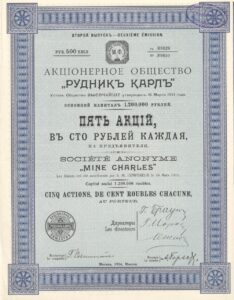
Société Anonyme “Mine Charles”
Акционерное Общество “Рудникъ Карлъ”
Other city spellings: Moscou, Moskau
Formed in 1911 with head office in Moscow. By 1914, capital had reached 1,200,000 roubles in shares of 100 roubles. The company was founded by the Wogau trading house to provide their Moscow Cement Factory in Podolsk with anthracite coal. The mine was located in Ekaterinoslav, today known as Dnipro in eastern Ukraine. The company was later absorbed by the cement factory.
1911
Description
The company was founded by the Wogau trading house to provide their Moscow Cement Factory in Podolsk with anthracite coal. The mine was located in Ekaterinoslav, today known as Dnipro in eastern Ukraine. It produced up to 90.000 tons of coal annually. The company was later absorbed by the cement factory (source: Boone April 2022).
Rudnik Karl is the first vertical shaft mine in the Donbass. Subsequently, the enterprise was transformed into a joint-stock company and belonged to the trading house “Vogau and Co” – one of the largest systems in Russia of joint-stock trading, industrial, financial enterprises, created in the second half of the 19th – early 20th centuries.
The mine was founded in 1890, when Karl Avgustovich Kron, a resident of Lorraine, bought 236 acres of land from the landowner Makarov, where a mine was then built. Kron appointed a Russified German, a resident of the village of Maloivanovka, Dudu Karl Karlovich, as the manager of the mine. From the mine “Karl” a cableway was built to the enterprise of the mine owner Violin, on the territory of which there was a coal warehouse, a transshipment base before sending coal to the railroad.
The charter of the joint-stock company Rudnik Karl was approved on March 16, 1911, the company’s fixed capital amounted to 1.2 million rubles (?). The trading house Vogau and Co. needed its own anthracite mine in the Donbass to supply fuel to the concerns’ factories, primarily the cement plants in Riga and Moscow Region (Podolsk). It was decided to keep the former name of the mine – Karl. In 1912-1913, coal production at the Karl mine amounted to 6.4 million pounds (105.2 thousand tons).
Shortly after the outbreak of World War I, the Vogau trading house had to curtail its activities in Russia, since almost all the leading positions in the company were occupied by German subjects. In May 1915, the office and part of the enterprises of the partnership were destroyed, in 1916 the company came under state supervision. After that, Vogau and Co. sold off all its assets, and family members fled Russia. (source: OldCurrency.RU)

